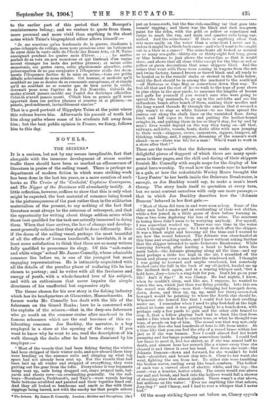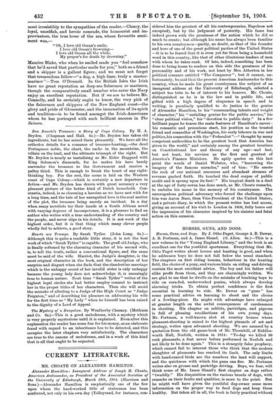• The Seiner& By James B. Connolly. London : Hodder
and Stoughton. real
IT is a curious, but not by any means inexplicable, fact that alongside with the immense development of steam marine traffic there should have been so marked an efflorescence of literature in praise of the sailing vessel. There is perhaps no department of modern fiction in which more striking work has been done in the last ten years, as a mere mention of such books as The Cruise of the 'Cachalot,' Captains Courageous, and The Nigger of the Narcissus will abundantly testify. A little reflection, however, suffices to show that this is only what might be expected, the best material of romance being found in the picturesqueness of the past rather than in the utilitarian materialism of the present, to say nothing of the fact that literature must always be the outcome of retrospect, and that the opportunity for writing about things seldom arises while those best qualified for the task are actually immersed in doing them. When that time arrives, the law of change and develop- ment generally ordains that they shall be done differently. But if the doom of the sailing vessel, perhaps the most beautiful of all the efforts of human handicraft, is inevitable, it is at least some satisfaction to think that there are so many writers fully qualified to pronounce its elegy. Of this "salt-water and white wings" school Mr. James Connolly, whose admirable
romance lies before us, is one of the youngest but most engaging representatives. He is intimately acquainted with all the details of the peculiar phase of seafaring life he has chosen to portray ; and he writes with all the freshness and
energy of youth, with a whole-hearted love of his subject, and with an enthusiasm that never impairs the simple directness of his unaffected but expressive style.
The theme chosen for his new story is the fishing industry which has its headquarters at Gloucester, Massachusetts. In former works Mr. Connolly has dealt with the life of the fishermen on the Grand Banks ; here he is concerned with the exploits of the seiners,—that is, the deep-sea fishermen who go south on the summer cruise after mackerel in the famous schooners which are the real heroines of this ex- hilarating romance. Joe Buckley, the narrator, is a boy employed in a store at the opening of the story. If you want to know why he went to sea, read the description of his walk through the docks after he had been dismissed by his employer :—
" Most of the vessels that had been fishing during the winter had been stripped of their winter sails, and now aboard these they were bending on the summer suits and slinging up what top spars had not already been sent up. For the vessels that had been laid up all winter and stripped of everything, they were getting out the gear from the lofts. Everywhere it was topmasts being sent up, sails being dragged out, stays swayed taut, hal- yards and sheets rove—an overhauling generally. On the rail- ways—Burnham's, Parkhurst's, and Tarr's—were vessels having their bottoms scrubbed and painted and their topsides lined out. And they all looked so handsome and smelt so fine with their riggings being tarred, not with the smoky tar that people ashore put on house-roofs, but the fine rich-smelling tar that goes into vessels' rigging ; and there was the black and dark sea-green paint for the sides, with the gold or yellow or sometimes red stripe to mark the run, and main and quarter rails being var- nished. And the seine-boats ! If there is anything afloat that sets more easily on the water than a seine-boat I never saw it, unless it might be a birch-bark canoe—and who'd want to be caught out in a blow in a canoe? The seine-boats all looked as natural as so many sea-gulls—thirty-six or thirty-eight feet long, green or blue bottoms to just above the water-line so that it would show, and above that all clear white except for the blue or red or yellow or green decorations that some skippers liked. And the seines that went with them were coming in wagons from the net and twine factory, tanned brown or tarred black and all ready to be hauled on to the vessels' decks or stowed in the holds below, until the fleet should be in among the mackerel to the south'ard —off Hatteras or Cape May or somewhere down that way. To feel all that and the rest of it—to walk to the tops of your shoes in pine chips in the spar yards, to measure the lengths of booms and gaffs for yourself if you weren't sure who were going to spread the big mainsails, to go up in the sail-lofts and see the sailmakers, bench after bench of them, making their needles and the long waxed threads fly through the canvas that it seemed a pity wasn't to stay so white forever—to see them spread the canvas out along the chalk lines on the varnished floor, fixing leach and luff ropes to them and putting the leather-bound cringles in, and putting them in too so they'd stay, for by and by men's lives would depend on the way they hung on—all that, railways, sail-lofts, vessels, boats, docks alive with men jumping to their work—skippers, crews, carpenters, riggers, lumpers, all thinking, talking, and, I suppose, dreaming of the season's work ahead—m-m—there was life for a man ! Who'd want to work in a store after that ? "
These are the vessels that the fishermen make songs about, delightful pieces of doggerel of which there are many speci- mens in these pages, and the skill and daring of their skippers furnish Mr. Connolly with ample scope for the display of his genial hero-worship. To read how the vessels race to harbour in a gale, or how the redoubtable Wesley Marrs brought the 'Lucy Foster' to her berth inside the Delaware Breakwater, is enough, as Joe Buckley would say, to make a man's heart thump. The story lends itself to quotation at every turn, but we must content ourselves with only one more passage,— that in which Joe Buckley describes how the Johnnie Duncan' behaved in her first gale :— " Most of them did turn in and were soon asleep. Some of the older men had a smoke and an overhauling of their wot clothes, while a few joined in a little game of draw before turning in. One or two were deploring the loss of the seine. The nearness to losing lives didn't seem to be worrying anybody. For myself, I was somewhat worked up. There was one time in the water when I thought I was gone. So I went on deck after the skipper. It was a black night and breezing all the time and I wanted to see how the vessel behaved. The Johnnie was close-hauled at this time and swashing under, and I knew without asking further that the skipper intended to make Delaware Breakwater. While hurrying forward, after lending a hand to batten down the main hatch—the Johnnie plunging along all the time—and my head perhaps a little too high in the air, I stumbled off the break and plump over a man under the windward rail. I thought I was going to leeward and maybe overboard, but somebody hooked onto the full in the back of my oil-jacket, hauled me up the inclined deck again, and in a roaring whisper said, 'Get a hold here, Joey—here's a ring-bolt for you. Don't let go on your life ! Isn't it fine ?' It was Clancy. He had nights, I know, when he couldn't sleep, and like me, I suppose, he wanted to watch the sea, which just then was firing grandly. Into this sea the vessel was diving—nose first—bringing her bowsprit down, down, down, and then up, up, up, until her thirty-seven-foot bowsprit would be pointing to where the North star should be. Whenever she heaved like that I could feel her deck swelling under me. I remember when 1 used to play foot-ball at the high school at home and it was getting handy to a touch-down, with perhaps only a few yards to gain and the other side braced to stop it, that a fellow playing back had to buck like that from under a. line when he had to scatter tons, or what ho thought was tons, of people on top of him. The vessel was that way now, only with every dive she had hundreds of tans to lift from under. At a time like that you can feel the ribs of a vessel brace within her just as if she was human. Now I could almost feel her heart pumping and her lungs pounding somewhere inside. I could feel her brace to meet it, feel her shiver, as if she was scared half to death, and almost hear her screech like a winner every time she cleared it and threw it over her head. Now down she went—the Johnnie Duncan—down and forward, for she wouldn't be held back—shoulders and breast slap into it. Clear to her waist she went, fighting the sea from her. To either side were tumbling the broken waves, curling away like beach combers. The hollow of each was a curved sheet of electric white, and the top—the crest—was a heavier, hotter white. The crests would rise above our rail and break, and back into the hollows would fall a shower of shooting stars that almost sizzled. There wasn't a star above, but millions on the water ! Ever see anything like that ashore, Joey-boy ?' said Clancy, and I had to roar a whisper that I never had."
Of the many striking figures set before us, Clancy appeals most irresistibly to the sympathies of the reader,—Clancy, the loyal, unselfish, and heroic comrade, the humourist and im- provisatore, the true lover of the sea, whose favourite senti- ment was,— " Oh, I love old Ocean's smile,
I love old Ocean's frowning—
I love old Ocean all the while, My prayer's for death by drowning."
Maurice Blake, who when he smiled made you "feel somehow that he'd saved that particular smile for you," both as a friend and a skipper is a gallant figure ; and we must not forget that tremendous fellow—" a dog, a high liner, truly a master- mariner "—Tom O'Donnell. In the British Isles the Irish have no great reputation as deep-sea fishermen or mariners, though the comparatively small number who enter the Navy enjoy an excellent reputation. But if we are to believe Mr.
Connolly, and he certainly ought to know, the very pick of the fishermen and skippers of the New England coast—the glory and pride of Gloucester, and the incarnation of its spirit
and tradition—is to be found amongst the Irish-Americans whom he has portrayed with such brilliant success in The







































 Previous page
Previous page